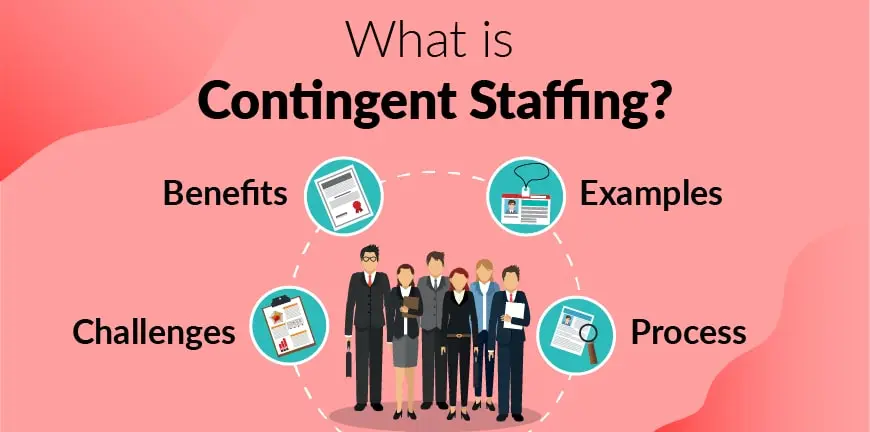India’s Silicon Valley Looking to Set up a GCC City
05/12/2024
Payroll Analytics and Metrics: Why Are They Important?
06/12/2024How businesses manage their workforce decides their chances of staying competitive in today’s world and contingent staffing plays a big role in helping them sustain their operations by providing diverse staffing solutions that can help them succeed. Contingent staffing benefits businesses in various industries by providing them with staff with specialized skills for their distinct projects or to lend a hand in seasonal workloads while reducing the overhead costs of organizations as they don’t require to hire them full time.
What is Contingent Staffing?
Contingent staffing meaning hiring temporary workers or contract employees on an on-demand basis or for short term projects or during seasonal workloads instead of hiring them full time. A contingent worker is essentially temporarily employed by a company and works for the company just like a full-time employee, except that they are there for a short period of time and do not get other perks that full time employees get like benefits, insurance etc.
When a company hires a contingent worker through a staffing company, based on their need, both parties can share responsibility for the contingent workers, as in, when it comes to ensuring they are paid on time, employment contracts, onboarding etc.
In today ‘s date, contingent workforce staffing has become increasingly significant due to the flexibility it provides. This practice allows businesses to scale up or down as required and can acquired talent individuals to work on their projects.
What are the Benefits of Contingent Staffing?
By adopting contingent staffing, organizations can transform their businesses as this type of staffing offers a dynamic approach to workforce management. Some of the benefits of contingent staffing are-
1. Flexibility
Contingent staffing allows companies the flexibility to scale up or down their workforce as per their changing business demands. Businesses can either choose to hire contingent workers during need, as in work on projects that requires specialized skills/during seasonal demands when they need extra hands or downsize their workforce when the need is absent.
2. Cost savings
There is absence of long-term financial commitment in contingent staffing. Companies are not liable to offer benefits or other perks to contingent workers, they are only supposed to take care of their compensation as per the term of the contract. This is cost saving for organizations.
3. Organizations can be agile
Contingent workers can be hired swiftly, as the staffing company has the capability to provide clients with a candidate on an immediate basis. This is a valuable trait, especially when businesses require immediate staff for projects or for seasonal demands.
4. Access to specialized talent on demand
Organizations can access individuals with specialized skills as and when they need. This is an advantage when they require talented individuals to work on important, complex projects at hand.
5. Lesser administrative burden
Since contingent workers stay only temporarily with the organization, the organization has lesser administrative tasks to manage with regards to these workers like benefits, payroll, hr management, and allow themselves time to focus on other core operations.
6. A trial period offered before hiring
In contingent staffing, organizations have the option to see if the contingent worker is right for the role/able to complete the tasks/fits in well, before forming a contractual agreement. This trial period ensures that the organisation finds the best fit.
7. Ability to scale swiftly
Contingent staffing allows for rapid scaling of the workforce, supporting businesses in meeting sudden surges in demand without long-term commitments.
What are the Challenges and Considerations in Contingent Staffing?
While there is a myriad of benefits that come with the contingent staffing approach there are also a few challenges and considerations to bear in mind.
1. Absence of a long-term commitment
While this is viewed as an advantage at certain times, not having a long-term commitment from the workers may sometimes have an impact on organizational stability.
2. Risk of quality
Contingent staff are there to work for you for a short period, and while it’s not always the case, at times, there could be inconsistencies in the quality of work they deliver as they may not be completely aware of compliance standards or even company standards.
3. Challenges fitting into company culture
As contingent workers are only part of your company for a short period of time, integrating them into the company successfully and making sure they fit well with the company culture and fit well with the team can be challenging.
4. Less scope for training
In case the contingent workers skills or work isn’t upto the mark, businesses may have to train them extra, but there is no guarantee as to how well this can work and if they actually implement this, as they do not have full control over contingent workers.
5. Legal compliance issues
It’s essential to classify your workers properly, and it is especially important when it comes to contingent workers. Misclassification of contingent workers can lead to legal issues and financial penalties.
6. Reduced employee loyalty
As contingent workers are only there for a small period, they may lack the loyalty and commitment towards the company as compared to permanent employees, which could affect their dedication towards work.
7. Overreliance is risky
Due to changing market conditions, sometimes, the contingent staffing company may find it difficult to find the right candidate. So, over relying on contingent staffing can be risky for companies.
Understanding these benefits and drawbacks is essential for organizations considering contingent workforce management. Each factor must be carefully weighed to make informed decisions that align with the company’s goals and needs.
What is the Contingent Staffing Process?
The contingent staffing process is designed to ensure that the client finds the right candidate in time and onboard them as swiftly as possible. The steps below can streamline the process-
1. Identification of client needs
The organization must clearly identify their staffing requirements. They must specify exact skills, qualifications, experience required for the role. Additionally, if applicable, they must also mention the project duration, expected deliverables etc. This can help ensure that the right candidates are found for the role.
2. Engage the right contingent staffing company
Do thorough research before outsourcing your staffing needs to a third-party staffing company. Ensure that they have the right experience, resources, reputation and capacity to deliver your expectations. A good contingent staffing company such as Alp Consulting will have access to a diverse pool of freelancers and contractors from which you can choose your right fit.
3. Conduction of targeted interviews
The right interview process can ensure that you select the right set of candidates who are skilled and are also the right fit for your team. A phone interview or a virtual interview covering all the initial questions can help gauge the candidate’s suitability. Further, to assess their skills, create the right assessment tests. This can help you figure if they align with your organisation’s goals.
4. Develop a smooth onboarding process
Make sure that the contingent workers are properly integrated into your company with a smooth onboarding process. Train them with project specific skills if required, provide them detailed orientation on your company’s culture, values, and expectations to help them understand your company.
5. Form the right contracts and agreements
The contract formed between the two parties must have all the important terms and conditions such as project duration, work arrangements, payment structures, and specific deliverables to protect both parties. Clearly define intellectual property rights to ensure that ownership of project-related creations is well understood.
6. Maintain constant communication
Use the right collaboration tools to facilitate constant communication with contingent workers in case they are working in a remote location or onsite. Implement a regular schedule for updates, task delegation, and feedback sessions. These check-ins are helpful for monitoring progress, addressing any issues, and ensuring that the project stays on track.
Contingent Worker Examples
There are various types of contingent staff an organisation can hire. Who they want to hire is dependent on the type of industry they are in, their skill requirements etc. Some of the contingent worker examples are-
- IT workers- Companies that are in the IT or other technology related fields hire freelance developers and IT professionals for short-term projects.
- Seasonal retail workers- Retailers often require workers with sales or marketing skills. They usually hire temporary staff during peak shopping seasons to handle increased customer demand.
- Event management- Event planning companies require contingent workers who are more physically ready to run around to ensure things happen and are in place. For example, event setup, registration, and security.
- Project-based consultants- Consulting firms employ contingent workers with specialized expertise based on the type of consulting they require for client projects.
- Gig economy platforms- Companies like Uber and food delivery services rely on a contingent workforce of drivers and couriers.
- Health care travel nurses. Hospitals hire travel nurses on a contingent basis to address staffing shortages.
FAQ- Frequently Asked Questions
1. What is a contingent worker?
A contingent worker is someone who works for an organization without being hired as their employee. They are often called temporary or contract employees.
2. What is the purpose of a contingent workforce?
Contingent workforces offer their skills and services on a provisional basis. This workforce segment includes contractors, consultants, freelancers, and temporary workers who are typically under a contract to complete a project or fill a role for a defined amount of time.
3. Is it good to hire contingent workers?
Yes, hiring contingent workers can be beneficial for businesses, as they can provide flexibility, access to specialized skills, and cost savings.
4. Who is responsible for contingent staffing in a company?
Both the HR and the procurement departments are responsible for contingent staffing and management of the contingent staff in a company.
5. How soon can you hire a contingent worker?
The time it takes to find a contingent worker can vary depending on several factors, including: The skills required for the role, The time constraints for the role, and the salary offered for the role.
Contact Us For Business Enquiry

Kasthuri R
Kasthuri R is the Co-Founder & Executive Director at ALP Consulting, bringing over 23 years of experience in search, staffing, and HR consulting. She has been instrumental in driving ALP’s recruitment, employee leasing, and executive search practices across diverse industry verticals. With deep expertise in talent acquisition, HR strategy, and operational management, Kasthuri has built scalable, client-focused solutions that enhance workforce efficiency. Her strategic leadership continues to steer ALP Consulting toward innovation and excellence in people management.




